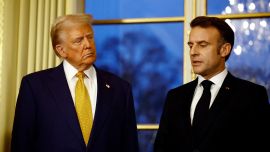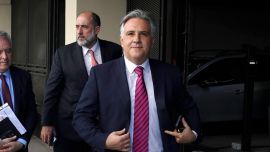A week may be a long time in politics but then, as the tango by Alfredo Le Pera which was made famous by Carlos Gardel told us, 20 years can pass by almost unnoticed. Though Argentina often seems to change at a bewildering speed – as she did when, to widespread astonishment, Alberto Fernández suddenly became the odds-on favourite to win the fast-approaching presidential elections and the markets freaked out – this does not mean that things are that different from what they were two, three or four decades earlier.
Many commentators have noted that, on returning from a brief trip abroad, you are likely to find yourself in unfamiliar territory, but if it is after a stay of 30 years, almost everything to do with the economy will be much as you left it.
Despite the allegedly progressive chitchat of people who think they are intellectuals, Argentina is an extremely conservative country whose politicians dream of restoring some departed golden age. Thus far, the election campaign pitting Kirchnerites against the followers of Mauricio Macri has been almost entirely about the past; thinking about the future can be so depressing. It is assumed that, if you manage to identify the miscreants who are responsible for the current mess which, needless to say, bears a close resemblance to many others the country has gone through, economic and social problems will be easy to solve. If only.
On starting his term in office, Macri promised to bring about radical change. In some areas he did manage to do quite well by showing a proper respect for the constitutional niceties, among them freedom of the press, and letting prosecutors and judges get on with their jobs without twisting their arms, thereby encouraging hopes that most thieving politicians, among them the former president Cristina Fernández de Kirchner and her many cronies, would end up behind bars.
But, as was made clear a few weeks ago, fighting corruption, drug-trafficking and other criminal activities with unusual vigour, or spending large amounts of money on public works that greatly benefit the poor, do not impress all that many voters. The new orthodoxy is that the best way – perhaps the only way – to achieve this is to put lots of money into people’s pockets, something Macri, like Raúl Alfonsín and Fernando de la Rúa before him, was unable to do. Alberto Fernández makes out that, being a card-carrying Peronist, he will succeed where such predecessors failed.
Time after time, Argentina crashes into the same brick wall because politicians, union bosses, media folk and many others are convinced it is not really there. As the name of the country – “the land of silver” – suggests, in this part of the world money should never be in short supply and to pretend otherwise is unpatriotic. The upshot is that anyone who goes on about the need to cut spending is liable to be taken for a confidence trickster who wants to swindle decent people out of what should be rightfully theirs. Macri, whose dad was once thought to be the richest man in Argentina, has been unable to dispel the notion that his genes and upbringing made him a mean-minded plutocrat who despises the poor.
The country’s political culture being what it is, telling people that a rigorous austerity programme is necessary because there is hardly any money left, will not get you very far. In Switzerland, Japan or Germany, tough talk about the dangers of overspending may bring about a positive response, but here, where thrift is seen as a synonym for theft, it will be met with catcalls. As a result, inflationary pressures are far stronger than elsewhere and have repeatedly proven to be irresistible.
Will Alberto Fernández, presuming he does move as expected into the Pink House before the year is out, manage to prevent the inflationary tidal wave that is building up from flooding most of the country? Or will he simply stand by, blame everything that is wrong on Macri, and let inflation do its destructive work?
This may be his game plan, but even so it would be hard for him to appease the “social movements” which are already warning him they will not tolerate what they would see as backsliding. Their leaders think the next government should give priority to the pressing needs of the poor without bothering about the macroeconomic details that obsess Macri. Such an approach may be morally defensible, but it would put paid to any chances the country might still have of getting the economy back on an even keel.
Alberto, who up to now has never shown much interest in ideological matters, surely wants to be a reasonably successful president, but the circumstances awaiting whoever gets sworn in means that, if elected, he will be obliged to choose between what looks politically advantageous and what would have to be done to avert an economic meltdown. To retain the popularity he enjoys when moving into office, he would have to order a spending spree that would delight public employees and satisfy the inhabitants of the enormous slum belt in Greater Buenos Aires, but which would mean hyperinflation. If he decides he cannot afford to let the economy go up in flames, he would have to take measures that would immediately be denounced by many of his Kirchnerite backers as heartlessly neoliberal. Either way, he would soon be in deep trouble.
For many years, Argentina’s answer to the conundrum all governments have faced for the best part of a hundred years was to allow populists to do their thing in the knowledge that, sooner or later, they would be replaced by paternalistic men in uniform determined to impose fiscal discipline. By behaving the way they did between 1976 and 1983, the Armed Forces put an end to that peculiar arrangement but not to the mentality behind it, as the Kirchnerites made clear by equating Macri’s inoffensive government with the most recent military dictatorship. From their point of view, anyone in favour of economic policies like those practised in developed countries must be an apologist for military rule and all the many unpleasant things that entails and should be treated accordingly. By now, Macri must be used to getting treated by his foes as though he were a tyrannical general in civilian garb; for Alberto Fernández, unless he has been looking forward to presiding over a hyperinflationary nightmare and decided to continue the war against capital and therefore capitalism Peronists have been singing about for over 70 years, it would be a novel and, no doubt, distressing experience.




















Comments